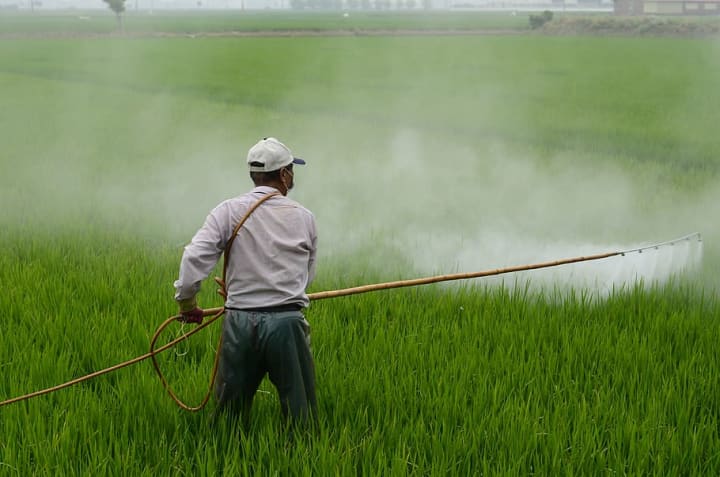
Introduction
Pesticides are chemical substances used to kill or control pests that damage crops, spread diseases, or cause other problems for humans or animals. Pesticides can be used in various forms, including sprays, powders, baits, and fumigants. While pesticides have proven effective in controlling pests and increasing crop yields, their use can also have significant environmental and health impacts. In this article, we will explore the benefits and risks associated with pesticides and their impact on human health and the environment.
- Benefits of Pesticides:
Pesticides have played a crucial role in increasing crop yields and ensuring food security. They help to control pests and diseases that can destroy crops, reducing the risk of crop failure and ensuring a stable food supply. Pesticides are also used in public health campaigns to control disease-carrying insects, such as mosquitoes, that can transmit deadly diseases like malaria and dengue fever.
In addition to increasing crop yields and ensuring food security, pesticides offer several other benefits:
1. Cost-effectiveness: Pesticides are a cost-effective solution for controlling pests and increasing crop yields. Compared to alternative pest control measures, such as biological control, pesticides are often more affordable and easier to apply.
2. Increased agricultural productivity: Pesticides help to protect crops from pests and diseases, reducing the risk of crop failure and increasing agricultural productivity. This increased productivity helps to meet the growing demand for food, particularly in developing countries where food security is a major issue.
3. Disease control: Pesticides are used in public health campaigns to control disease-carrying insects, such as mosquitoes, that can transmit deadly diseases like malaria and dengue fever. Pesticides are also used to control the spread of plant diseases, such as potato blight and citrus greening disease.
4. Conservation of natural resources: Pesticides can help to conserve natural resources by reducing the amount of land required for agricultural production. By increasing crop yields, pesticides can help to meet the growing demand for food without the need to clear additional land for farming.
5. Increased profits for farmers: By protecting crops from pests and diseases, pesticides can increase the profitability of farming operations. This increased profitability allows farmers to invest in new equipment and technology, further improving agricultural productivity and sustainability.
It is important to note, however, that while pesticides offer many benefits, their use must be carefully regulated and managed to minimize their environmental and health impacts. Integrated Pest Management practices and alternative pest control measures can offer sustainable approaches to pest control that reduce reliance on pesticides and their associated risks.
- Risks of Pesticides:
Pesticides can have significant environmental and health impacts. They can contaminate soil, water, and air, causing harm to ecosystems and wildlife. Pesticides can also harm human health, causing acute and chronic health effects, such as skin and eye irritation, respiratory problems, and cancer.
- Environmental Impact:
Pesticides can have harmful effects on the environment. They can contaminate soil and water, harming the organisms that live in these ecosystems. Pesticides can also harm non-target organisms, such as bees and other pollinators, that play a crucial role in the pollination of crops and the maintenance of ecosystems. Pesticides can also accumulate in the food chain, leading to the bioaccumulation of toxic substances in animals and humans.

- Health Impact:
Pesticides can have significant health impacts, particularly on those who work with or are exposed to them regularly. Acute effects can include skin and eye irritation, nausea, dizziness, and vomiting. Chronic effects can include cancer, reproductive problems, and neurological damage. Children, pregnant women, and the elderly are particularly vulnerable to the health effects of pesticides.
- Regulation and Management:
To ensure the safe use of pesticides, governments have established regulations and management practices to minimize their environmental and health impacts. These regulations include restrictions on the use of certain pesticides, the establishment of safety standards for pesticide use, and requirements for the labeling and packaging of pesticides. Integrated Pest Management (IPM) practices, which focus on reducing the use of pesticides by employing a range of alternative pest control measures, have also been developed.
- Alternatives to Pesticides:
There are a range of alternative pest control measures that can be used in place of pesticides. These measures include biological control, which involves using natural predators and parasites to control pest populations, crop rotation, which involves alternating crops to reduce the build-up of pest populations, and cultural control, which involves using planting techniques and other cultural practices to control pests.
- Conclusion:
Pesticides are essential for ensuring food security and controlling disease-carrying pests. However, their use can have significant environmental and health impacts, and it is essential to regulate and manage their use to minimize these impacts. Integrated Pest Management practices and alternative pest control measures offer sustainable approaches to pest control that can reduce reliance on pesticides and their environmental and health impacts.
About the Creator
Love The Green
Welcome to my page,I hope to share my experiences, insights, and knowledge with fellow nature enthusiasts.Together, we can celebrate the wonders of the natural world, and work to protect and preserve it for future generations to enjoy🌿🌲






Comments
There are no comments for this story
Be the first to respond and start the conversation.